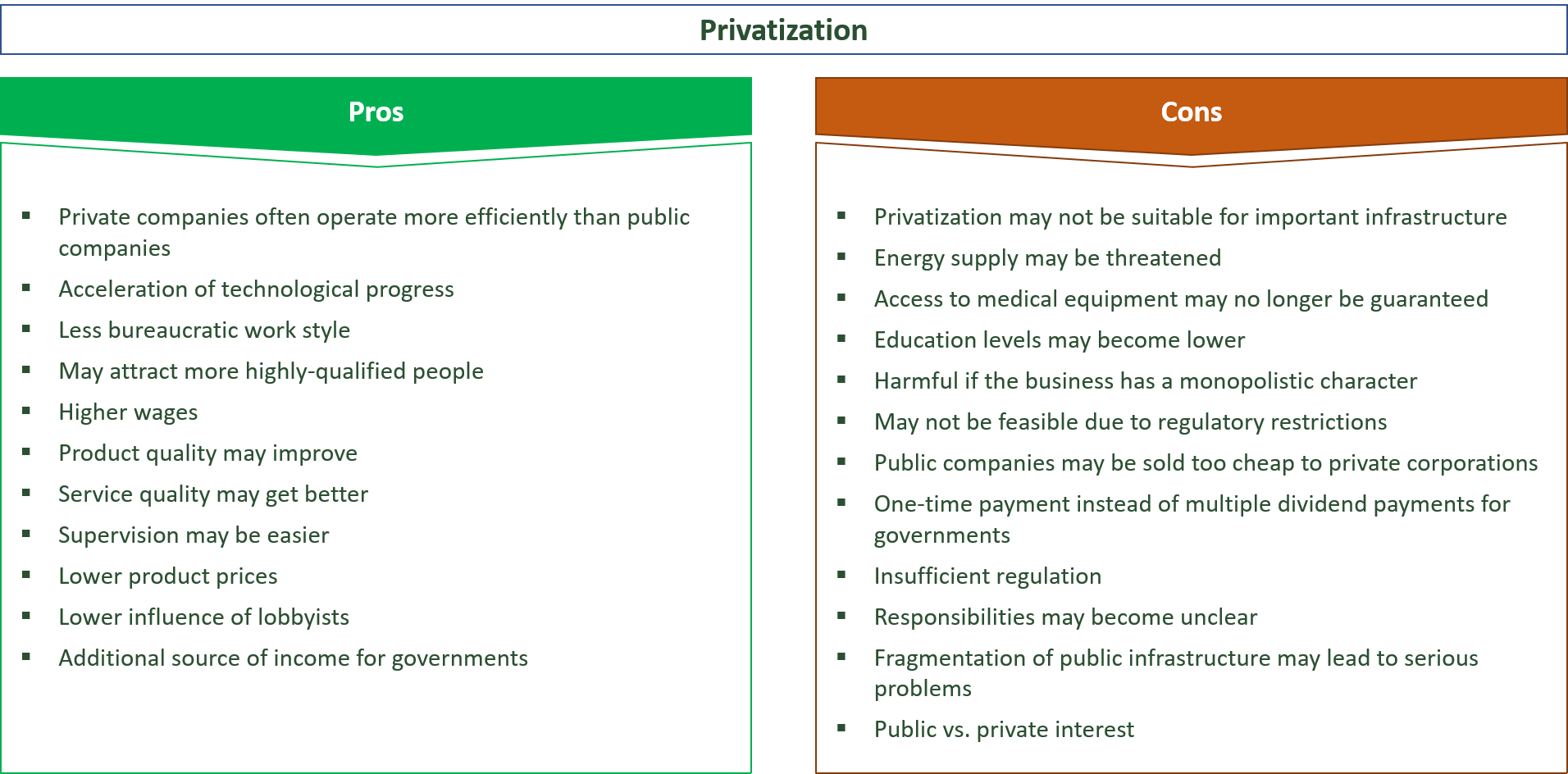“Privatization is more efficient and effective in some cases, but not in intelligence.”
Valerie Plame, Writer
Advantages & Disadvantages of Privatization

Privatization means that a government-owned business or property becomes owned by a private corporation.
For instance, if the government needs money, it can sell land to private companies, which may build houses on it and sell them afterward.
Privatization can make sense for a variety of different reasons and had been quite popular in the recent past.
Yet, there are also many problems with privatization.
In this article, the pros and cons of privatization are examined in detail.
Audio Lesson
Contents
Advantages of Privatization
- Private companies often operate more efficiently than public companies
- Acceleration of technological progress
- Less bureaucratic work style
- May attract more highly-qualified people
- Higher wages
- Product quality may improve
- Service quality may get better
- Supervision may be easier
- Lower product prices
- Lower influence of lobbyists
- Additional source of income for governments
Private companies often operate more efficiently than public companies
One important advantage of privatization is that private companies often operate in a much more efficient manner compared to companies that are owned by the government.
This is due to the fact that publicly owned companies often do not have any price-pressure and can operate in a rather slow manner while private companies have to compete in a fierce free market and in case they are not efficient enough, companies in the private sector will go bankrupt.
Hence, in order to increase the overall level of efficiency of processes inside the firm, it can make sense to privatize companies in order to increase the pressure for necessary adjustments in processes.
Acceleration of technological progress
Privatization may also accelerate our overall technological progress.
Since private companies have to compete in fierce markets, they are often required to invent new technologies and products in order to stay competitive in the long run.
Technological progress is extremely important in order to solve our environmental problems and therefore, privatization can also help to improve the ecological footprint of a company in the long run.
Less bureaucratic work style
Another benefit of privatization is that it may lead to a less bureaucratic work style.
In many companies that are owned by the government, processes are quite standardized and the level of individuality for employees is quite limited.
Moreover, many of those bureaucratic processes are quite inefficient and could be greatly improved through privatization.
Therefore, in order to give employees more opportunity to express their own ideas and to lower the level of bureaucracy in a company, privatization may be an effective measure to do so.
May attract more highly-qualified people
Ambitious people who aspire to a demanding corporate career often want to go for a career in the private rather than in the corporate sector since they will have more room to contribute their own ideas and will also earn more money on average.
However, this is a serious problem for publicly-owned companies since only if you have excellent leaders in a company, the company will stay profitable and competitive in the long run.
Thus, also to attract a sufficient number of highly-qualified employees, the privatization of companies can make quite a lot of sense.
Higher wages
Private companies will also be able to pay higher wages on average.
This is quite important to get really good employees to work for a company.
However, in companies that are owned by the government, there are often certain salary caps in place and managers will only earn a certain maximum amount of money.
If those managers can earn a multiple in privately-owned companies, they will most often decide to work for a company in the private sector.
Thus, in order to give a company the opportunity to employ the best people possible, privatization might be needed to get the best talents.
Product quality may improve
Another upside of privatization is that it might lead to better product quality.
Since private companies have to face fierce competition on a regular basis and have to act in a profit-maximizing manner, they have to ensure that their products are as good as possible to stay competitive in the long run.
In contrast, the product quality of publicly owned businesses might be rather low since those companies will not have too strict profit-maximizing goals and may provide a lower product quality due to that.
Hence, if we want to have the best products possible, privatization may contribute to this goal in the long run.
Service quality may get better
Not only the products, but also the service quality of privately-owned companies may be far better than the service quality of publicly owned corporations.
Service is everything in our nowadays society since people have less time and are often quite stressed.
Thus, private companies have to provide the best possible service to stay competitive.
Consequently, while public companies may see no need to provide a better service, private companies may improve their service quality as soon as possible and therefore, consumers may also benefit from a much better service quality through privatization.
Supervision may be easier
In private companies, there are many controlling instances in place that aim to detect unlawful behavior.
They are also meant to control what the board of directors is doing and in case those actions can be considered to be harmful to a company, the board members may be replaced after a rather short period of time.
However, in publicly owned companies, those controlling instances may be far less efficient and therefore, many decisions may be made that are rather bad for the company.
Hence, in order to assure that the controlling instances inside a company are as sophisticated as possible, privatizing public companies may be a good idea.
Lower product prices
Due to the higher level of competition in the private corporate sector and the higher level of efficiency compared to publicly owned companies, chances are that also the product prices will decrease.
Of course, this is only true for sectors in which there is fierce competition.
In case natural monopolies are privatized, chances are that prices will actually increase since private companies will often try to exploit their market power.
Lower influence of lobbyists
Lobbying is a big problem that leads to many unpleasant decisions of policymakers.
This is especially true when it comes to publicly owned corporations.
There is a significant conflict of interest regarding the decisions of politicians and the goals of public corporations and many of those decisions may favor publicly owned companies instead of the general public.
Hence, by privatizing public companies, the influence of lobbyists can be lowered, at least to a certain extent.
Additional source of income for governments
Another advantage of privatization is that it can be a good income source for governments.
Especially if governments are close to failure and urgently need money, it might make sense to sell publicly-owned corporations or properties in order to reduce government debt.
Hence, if a government urgently needs money, privatization may be one of the last tools available to it.

Disadvantages of Privatization
- Privatization may not be suitable for important infrastructure
- Energy supply may be threatened
- Access to medical equipment may no longer be guaranteed
- Education levels may become lower
- Harmful if the business has a monopolistic character
- May not be feasible due to regulatory restrictions
- Public companies may be sold too cheap to private corporations
- One-time payment instead of multiple dividend payments for governments
- Insufficient regulation
- Responsibilities may become unclear
- Fragmentation of public infrastructure may lead to serious problems
- Public vs. private interest
- May need the foundation of additional supervisory departments
- Some people may lose their jobs
Privatization may not be suitable for important infrastructure
Even though privatization implies many important advantages, there are also serious downsides related to it.
One problem with privatization is that it might not be suitable for important infrastructure projects.
For instance, there are some institutions like power plants or other facilities that should still be owned by the government instead of private corporations in order not to lose control over those important facilities which are crucial to assure a high quality of life for the local population.
Energy supply may be threatened
Another downside of privatization is that our energy supply may be threatened in case private companies will own the energy supply system.
For instance, energy companies could decide to raise energy prices significantly and the general public would have no choice other than to pay those prices in order to assure their electricity supply.
Hence, if we want to privatize our energy supply, governments have to make sure that are strict regulations in place that prevent energy production companies from exploiting the general public.
Access to medical equipment may no longer be guaranteed
Not only energy is crucially needed in order to assure a stable economy, also the supply with medical equipment is crucial so that people who get sick can be treated in hospitals in an appropriate manner.
However, if we privatize too many companies in the medical sector, chances are that there might be shortages in the supply of medical equipment, which may translate into serious health issues for many people.
Thus, the medical sector is another industry that should not be privatized in order to protect the general public.
Education levels may become lower
Education is crucial for success in all parts of our daily life.
Hence, it is crucial that we guarantee a high quality of education in our schools and in our universities.
Therefore, it may be quite questionable to privatize those institutions since the quality of education would no longer be assured by the government but would rather lie in the hands of private education facilities.
Another problem with the privatization of education facilities is that only children from rich parents would get the opportunity for good education while the general public may not be able to afford this kind of education for their kids.
Consequently, privatizing the educational sector might not be a good idea for all of those reasons mentioned before.
Harmful if the business has a monopolistic character
While product prices can actually become lower through privatization of companies that are subject to fierce competition, the opposite may be true for natural monopolies.
For instance, if an airport is privatized, the airport will often have monopolistic power since many people in a specific region will have to rely on this single airport.
In turn, this airport can dictate prices and chances are that through privatization, the prices for flights may significantly increase over time.
May not be feasible due to regulatory restrictions
Whether privatization of public companies makes sense or not has to be evaluated on an individual basis.
In some cases, those privatizations may also not be feasible since they might violate local laws.
In such a case, even though the privatization of companies might make sense, it will not be possible to do so.
Moreover, the whole planning processes as well as the privatization of companies often take quite a long time since plenty of bureaucratic work has to be done in the whole process.
This also implies that privatization can also be quite costly for the government due to many restrictions and laws that have to be taken into account before privatizing a company becomes possible.
Public companies may be sold too cheap to private corporations
In many cases, private corporations and investment funds know way better how to negotiate and what a company is worth compared to public servants who will be responsible for selling those companies to private corporations.
In turn, this may also lead to a state where public companies are sold at a quite cheap price.
Consequently, this can be considered to be quite bad for the taxpayer and therefore, selling those companies at a rather cheap price may not be in the interest of the general public.
One-time payment instead of multiple dividend payments for governments
Another issue of privatization is that governments will only get a one-time payment when they sell a publicly owned company.
Yet, in case the government wasn’t selling this company, the government would get dividend payments into perpetuity.
Therefore, governments have to decide whether the one-time payment is sufficiently high to compensate for the lost numerous dividend payments in the future.
If those decisions are not made in a correct manner since government employees may not have sufficient knowledge to valuate those companies in a proper manner, chances are that plenty of money will be lost due to those transactions.
Insufficient regulation
In some cases, there might also be far too little regulation in place.
In case there is only insufficient regulation in the respective sector, privatizing companies in this sector might not be a good idea at all since those companies may have too much freedom to operate in a manner that is not beneficial for the general public at all.
Hence, before privatizing companies, governments should make sure that sufficient regulation is in place to ensure a positive outcome for the local population.
Responsibilities may become unclear
Especially in a market with plenty of interconnections and interdependencies, the privatization of companies may lead to serious problems since the responsibilities of companies may become unclear.
In turn, there may be plenty of disputes and lawsuits regarding which company is responsible for which service.
In the worst case, this might lead to serious shortages regarding the supply with important goods.
Therefore, making sure that every party knows their responsibilities is crucial before privatizing public companies in order to avoid several unpleasant surprises and confusion.
Fragmentation of public infrastructure may lead to serious problems
Another downside of privatization is that it may lead to the fragmentation of important public infrastructure.
For instance, while the distribution of energy might still be carried out by the government, the production of energy might be privatized, which is often referred to as electricity deregulation.
In such a case, there is a serious danger for power shortages since if the energy production companies are not able to produce energy for various reasons, the general public may not be supplied with energy and also many production processes of companies may collapse.
Therefore, in those important industry branches, the fragmentation that might occur due to privatization should be avoided at all costs.
Public vs. private interest
While public corporations are often meant to act in a manner that benefits the general public, private corporations may solely have the goal of profit maximization in order to please their shareholders.
However, profit maximization often also implies the excessive pollution of our environment since negative externalities are not properly internalized.
Hence, in order to protect our environment from various forms of pollution and to guarantee a livable future for the next generations, we may want to refrain from privatizing public companies.
May need the foundation of additional supervisory departments
Privatization may also imply the need to found additional departments in order to supervise the privatized companies in a sufficient manner.
This also includes employing additional employees.
In turn, this also leads to significant administrative costs since those additional workers have to be paid by taxpayers’ money.
Hence, the additional administrative costs that are related to the privatization of companies may be another argument against privatizing public firms.
Some people may lose their jobs
Most private corporations act in a profit-maximizing manner and therefore, also some jobs may be lost through privatization.
If a private company comes to the conclusion that some workers are no longer needed, the company will quite often simply fire those workers.
In contrast, in publicly owned companies, there is not too much pressure for profit maximization and therefore, workers may still be employed, even though those workers might not be urgently needed.
Thus, privatization may also lead to job losses for a significant number of people in the long run.

Top 10 Privatization Pros & Cons – Summary List
| Privatization Pros | Privatization Cons |
|---|---|
| Privatization can improve efficiency | May not be senseful for important sectors |
| Higher salaries for employees | Threat to our energy supply |
| Potential lower product prices | Privatization may lower education levels |
| Better product quality | Lack of access to medical equipment |
| Technological progress may be accelerated | May create private natural monopolies |
| Better service quality | Public companies may be sold too cheap |
| Income source for governments | One-time payment vs. dividends |
| Higher level of knowledge in the private sector | Fragmentation of public infrastructure |
| Important to get good employees | Some people may become unemployed |
| Less bureaucracy | Unclear responsibilities |
Does Privatization Make Sense?
Whether privatization makes sense or not is not easy to answer.
There are so many factors that play a role in this discussion and all the pros and cons of privatization have to be evaluated on an individual basis.
Only then will it be possible to make profound decisions that can benefit the general public in the long run.
Sources
https://en.wikipedia.org/wiki/Privatization
https://www.investopedia.com/terms/p/privatization.asp
https://www.britannica.com/topic/privatization

About the author
My name is Andreas and my mission is to educate people of all ages about our environmental problems and how everyone can make a contribution to mitigate these issues.
As I went to university and got my Master’s degree in Economics, I did plenty of research in the field of Development Economics.
After finishing university, I traveled around the world. From this time on, I wanted to make a contribution to ensure a livable future for the next generations in every part of our beautiful planet.
Wanna make a contribution to save our environment? Share it!